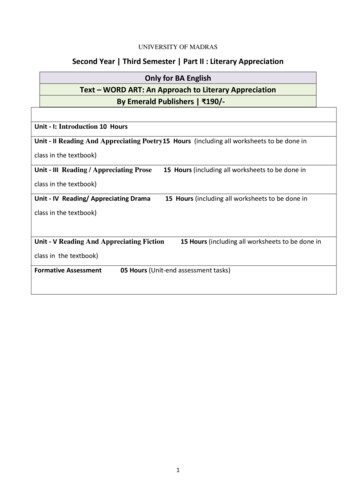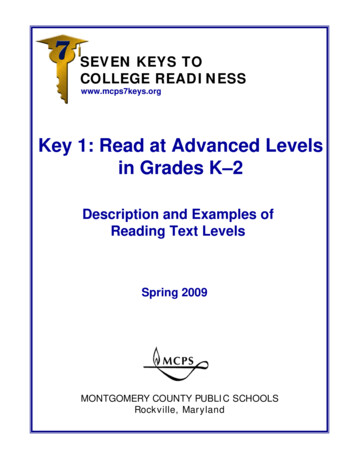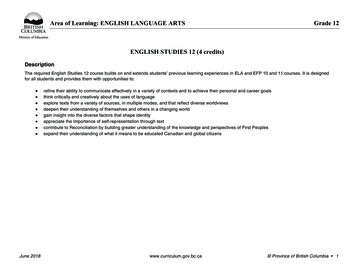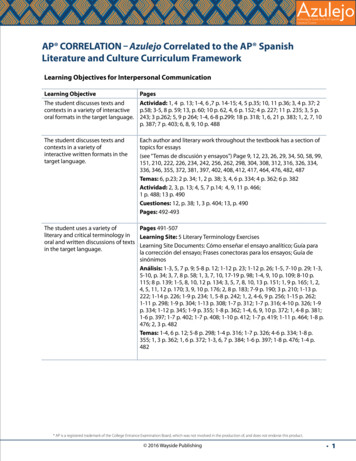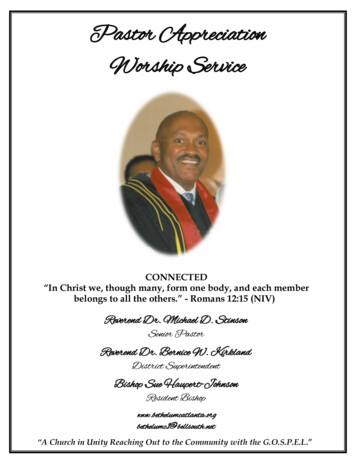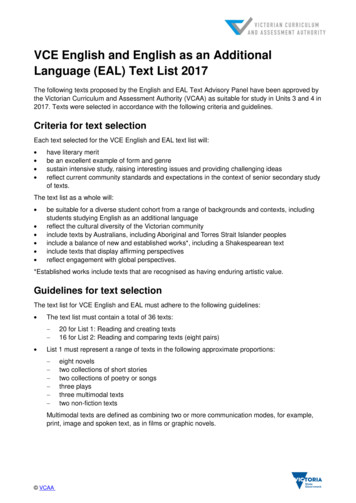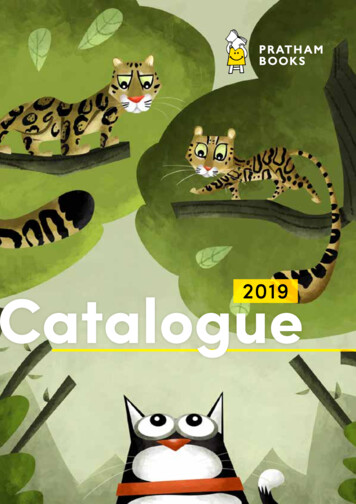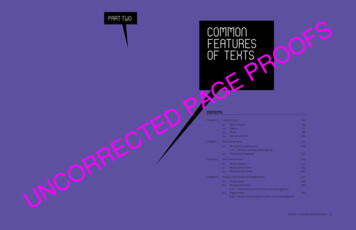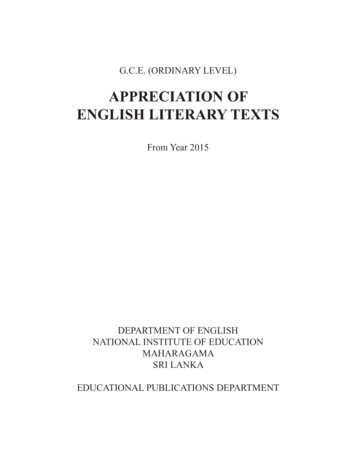
Transcription
G.C.E. (ORDINARY LEVEL)APPRECIATION OFENGLISH LITERARY TEXTSFrom Year 2015DEPARTMENT OF ENGLISHNATIONAL INSTITUTE OF EDUCATIONMAHARAGAMASRI LANKAEDUCATIONAL PUBLICATIONS DEPARTMENT
First PrintSecond PrintThird PrintFourth PrintFifth PrintSixth PrintSeventh Print-2014201520162017201820192020All Rights ReservedISBN 978-955-25-0203-3ACKNOWLEDGEMENTWe are grateful to the authors who grantedpermission to reproduce their poems in thistextbook.Published by Educational Publications DepartmentPrinted by State Printing Corporation,Panaluwa, Padukka.ii
The National Anthem of Sri LankaSri Lanka MathaApa Sri Lanka Namo Namo Namo Namo MathaSundara siri barinee, surendi athi sobamana LankaDhanya dhanaya neka mal palaturu piri jaya bhoomiya ramyaApa hata sepa siri setha sadana jeewanaye mathaPiliganu mena apa bhakthi pooja Namo Namo MathaApa Sri Lanka Namo Namo Namo Namo MathaOba we apa vidyaObamaya apa sathyaOba we apa shakthiApa hada thula bhakthiOba apa alokeApage anupraneOba apa jeevana weApa mukthiya oba weNava jeevana demine, nithina apa pubudukaran mathaGnana veerya vadawamina regena yanu mana jaya bhoomi karaEka mavakage daru kela bevinaYamu yamu vee nopamaPrema vada sema bheda dureradaNamo, Namo MathaApa Sri Lanka Namo Namo Namo Namo Mathaiii
wms fjuq tl ujlf. orefjdatl ksjfiys fjfikdtl mdge;s tl reêrh fõwm lh ; ÿjkdtneúks wms fjuq fidhqre fidhqßfhdatl f,i tys jefvkdÔj;a jk wm fuu ksjfiafid k isáh hq; fõieug u fu;a lreKd . fKkSfj S iu.s oñkSrka ñKs uq; fkd j th u h iem;dlsis l, fkdu Èrkdwdkkao iurfldakaiv
v
PrefaceThis new “Appreciation of English Literary Texts” for G.C.E. (O/L) will beimplemented from year 2015 onwards, and the students who offer this subjectare expected to sit for the examination for the first time in year 2016.Syllabus revision is a periodic exercise that the National Institute of Educationundertakes in conformity with the education policy of the government, torevitalize the process of learning and teaching. It is done with the intentionof exposing teachers and learners to new experiences and make them awareof current thinking and innovations. The new syllabus for ‘Appreciation ofEnglish Literary Texts’ provides exciting literary experiences to students in thatit incorporates a body of texts written by some of the world’s greatest writers,English and non-English, local and foreign, classical and modern. Among thepoets there are Keats and Blake, Gooneratne and Szymborska. Among thedramatists and novelists are Chekhov and Kinoshita, Narayan and Twain andour own Tissa Abeysekara.The Anthology contains all the prescribed texts except the novels which are:The Vendor of Sweets - R.K. Narayan (Indian Thought Publications)Bringing Tony Home - Tissa Abeysekara (North Atlantic Books)The Prince and the Pauper - Mark Twain (Puffin Classics)All the novels will be tested at the G.C.E. (O/L) examination. However studentsare expectd to study only one of them. To promote wider enjoyment and criticalawareness, teachers can select another novel (not the one selected for closestudy in the classroom) for school based assessment.It is our hope that this Anthology would help teachers to explore literaturein English with passion, and become better users of English as well as betterhuman beings.vi
Syllabus Revision CommitteeDirection and Supervision:Ven. Dr. Mabulgoda Sumanarathana, DDGFaculty of Languages and HumanitiesInternal Resource Persons:Champa PereraSenior Lecturer-Department of English,Director, External Resource Management Unit, NIES. A. D. SamaraweeraDirector, Department of English, NIEExternal Resource PersonsNalinika RajapakshaLecturer - Department of English, NIE1. Kamala Wijeratna:Retired Chief Project Officer NIEVisiting Lecturer, Department of HumanitiesEducation, Faculty of Education,University of Colombo2. Lal Medawattegedara:Lecturer in English, Open University of Sri Lanka3. Chandrani Ramanayaka:Retired Assistant Director of Education(Gampaha Educational Zone)4. H.D.R. Hemachandra :Assistant Principal, Royal College, Colombo-075. R.R. Attygalle:Devi Balika M.V., Dompe6. Mithila Weerasinghe:RESC, Kurunegala7. K. Kulenthiran:RESC, Batticaloa8. M.G.K. Willson:RESC, Nuwara Eliya9. R.M.L.U. Premaratne:Devi Balika Vidyalaya, Colombo 08CoordinationW. Indumini Darshika:Assistant CommissionerEducational Publications DepartmentComputerTypesetting:D.M. Jayani Nisansala DissanayakaCharani Nishamini Wijerathne Alahakoon(Educational Publications Department)vii
PoetryG.C.E. (O/L) Syllabus for Appreciation ofEnglish Literary TextsFrom Year 2015Theme : NatureTo the Nile - John KeatsA Bird Came Down the Walk - Emily DickinsonThe Eagle - Alfred Lord TennysonTo the Evening Star - William BlakeTheme : ConflictWar is Kind - Stephen CraneThe Terrorist, He’s Watching - Wislawa SzymborskaFarewell to Barn and Stack and Tree - A.E. HousmanBreakfast - Jacques Prevert (Translated by Regi Siriwardene)Theme : SocietyOnce Upon a Time - Gabriel OkaraI Know Why the Caged Bird Sings - Maya AngelouRichard Cory - Edwin Arlington RobinsonBig Match, 1983 - Yasmine GooneratneTheme : LifeThe Earthen Goblet - Harindranath ChattopadhyayaFather and Son - Cat StevensFear - Gabriela Mistral (Translated by Doris Dana)The Clown’s Wife - Johnson AgardTheme : HumourThe Camel’s Hump - Rudyard KiplingUpside-Down-Alexander Kushner (Translated by Margaret Wettin)The Huntsman - Edward LowburyTwo’s Company - Raymond Wilsonviii
Prose (Short Stories and Non- Fiction)1. The Nightingale and the Rose- Oscar Wilde2. An extract from ‘Colin Cowdrey Lecture’ - The Lahore Attack- Kumar Sangakkara3. The Lumber Room- Saki4. An extract from‘Wave’- A Memoir of Life after the Tsunami- Sonali DeraniyagalaDrama1. Twilight of a Crane- Yu Zuwa Junji Kinoshita2. The Bear- Anton ChekhovNovels1. The prince and the Pauper- Mark Twain2. Bringing Tony Home- Tissa Abeysekara3. The Vendor of Sweets- R.K. Narayanix
CONTENTSPOETRY1. To the Nile2. A Bird Came Down the Walk3. The Eagle4. To the Evening Star5. War is Kind6. The Terrorist,He’s Watching7. Farewell to Barn and Stack and Tree 8. Breakfast9. Once Upon a Time10. I Know Why the Caged Bird Sings11. Richard Cory12. Big Match, 198313. The Earthen Goblet14. Father and Son15. Fear16. The Clown’s Wife17. The Camel’s Hump18. Upside-Down19. The Huntsman20. Two’s Company-PAGE NO.John Keats01Emily Dickinson01Alfred Lord Tennyson02William Blake02Stephen Crane03Wislawa Szymborska04A.E. Houseman05Jacques Prevert06(Translated by Regi Siriwadene)Gabrial Okara07Maya Angelou08Edwin Arlington Robinson09Yasmine Gooneratne10Harindranath Chattopadhyaya12Cat Stevens13Gabriela Mistral14(Translated by Doris Dana)Johnson Agard15Rudyard Kipling16Alexander Kushner17(Translated by Margart Wettin)Edward Lowbury18Raymond Wilson19PROSE1. The Nightingale and the Rose- Oscar Wilde2. An extract from‘Colin Cowdrey Lecture’- The Lahore AttackKumar Sangakkara20273. The Lumber Room- Saki304. An extract from‘Wave’- A Memoir of Life after the TsunamiSonali Deraniyagala37DRAMA1. Twilight of a Crane- Yu Zuwa Junji Kinoshita412. The Bear- Anton Chekhov67AnnexureProposed term-wise breakdown of the syllabusx88
NatureTo the NileSON of the old moon-mountains African!Chief of the Pyramid and Crocodile!We call thee fruitful, and that very while,A desert fills our seeing’s inward span;Nurse of swart nations since the world began,Art thou so fruitful? Or dost thou beguileSuch men to honour thee, who, worn with toil,Rest for a space ‘twixt Cairo and Decan?O may dark fancies err! They surely do;‘Tis ignorance that makes a barren wasteOf all beyond itself, thou dost bedewGreen rushes like our rivers, and dost tasteThe pleasant sun-rise, green isles hast thou too,And to the sea as happily dost haste.John KeatsA Bird Came Down the WalkA bird came down the walk:He did not know I saw;He bit an angle-worm in halvesAnd ate the fellow, raw.And then he drank a dewFrom a convenient grass,And then hopped sidewise to the wallTo let a beetle pass.He glanced with rapid eyesThat hurried all abroadThey looked like frightened beads, I thought;He stirred his velvet head1
Like one in danger; cautious,I offered him a crumb,And he unrolled his feathersAnd rowed him softer homeThan oars divide the ocean,Too silver for a seam,Or butterflies, off banks of noon,Leap, plashless, as they swim.Emily DickinsonThe Eagle (A Fragment)He clasps the crag with crooked hands;Close to the sun in lonely lands,Ring’d with the azure world, he stands.The wrinkled sea beneath him crawls;He watches from his mountain walls,And like a thunderbolt he falls.Alfred Lord TennysonTo the Evening StarTHOU fair-hair’d angel of the evening,Now, whilst the sun rests on the mountains, lightThy bright torch of love; thy radiant crownPut on, and smile upon our evening bed!Smile on our loves, and while thou drawest theBlue curtains of the sky, scatter thy silver dewOn every flower that shuts its sweet eyesIn timely sleep. Let thy west wind sleep onThe lake; speak silence with thy glimmering eyes,And wash the dusk with silver. Soon, full soon,Dost thou withdraw; then the wolf rages wide,And then the lion glares through the dun forest:The fleeces of our flocks are cover’d withThy sacred dew: protect them with thine influence!William Blake2
ConflictWar is KindDo not weep, maiden, for war is kindBecause your lover threw wild hands towards the skyAnd the affrighted steed ran on aloneDo not weepWar is kind.Hoarse, booming drums of the regimentLittle souls who thirst for fightThese men were born to drill and dieThe unexplained glory flies above themGreat is the battle god, great and his kingdomA field where a thousand corpses lie.Do not weep babe, for war is kindBecause your father tumbled in the yellow trenchesRaged at his breast, gulped and died.Do not weepWar is kind.Swift blazing flag of the regimentEagle with crest of red and goldThese men were born to drill and diePoint for them the virtue of slaughterMake plain to them the excellence of killingAnd a field where a thousand corpses lie.Mother whose heart hung humble as a buttonOn the bright splendid shroud of your sonDo not weepWar is kind3Stephen Crane
The Terrorist, He’s WatchingThe bomb in the bar will explode at thirteen twenty.Now it’s just thirteen sixteen.There’s still time for some to go in,And some to come out.The terrorist has already crossed the street.That distance keeps him out of danger,and what a view- just like the movies:A woman in a yellow jacket, she’s going in.A man in dark glasses, he’s coming out.Teenagers in jeans, they’re talking.Thirteen seventeen and four seconds.The short one, he’s lucky, he’s getting on a scooter,but the tall one, he’s going in.Thirteen seventeen and forty seconds.That girl, she’s walking along with a green ribbon in her hair.But then a bus suddenly pulls in front of her.Thirteen eighteen.The girl’s gone.Was she that dumb, did she go in or not,we’ll see when they carry them out.Thirteen nineteen.Somehow no one’s going in.Another guy, fat, bald, is leaving, though.Wait a second, looks like he’s looking for something in hispockets andat thirteen twenty minus ten secondshe goes back in for his crummy gloves.Thirteen twenty exactly.This waiting, it’s taking forever.Any second now.No, not yet.Yes, now.The bomb, it explodes.Wislawa Szymborska4
Farewell to Barn and Stack and Tree“Farewell to barn and stack and tree,Farewell to Severn shore.Terence, look your last at me,For I come home no more.“The sun burns on the half-mown hill,By now the blood is dried;And Maurice amongst the hay lies stillAnd my knife is in his side.“My mother thinks us long away;,Tis time the field were mown.She had two sons at rising day,To-night she’ll be alone.“And here’s a bloody hand to shake,And oh, man, here’s good-bye;We’ll sweat no more on scythe and rake,My bloody hands and I.“I wish you strength to bring you pride,And a love to keep you clean,And I wish you luck, come Lammastide,At racing on the green.“Long for me the rick will wait,And long will wait the fold,And long will stand the empty plate,And dinner will be cold.”A. E. Houseman55101520
BreakfastHe poured coffeeinto his cuphe put milkin his cup of coffeehe put sugarin his cup of coffee and milkWith his teaspoonhe stirred ithe drank the coffee and milkand he put down the cupwithout speaking to meHe lita cigarettehe made ringswith the smokehe put the ashesin the ash-traywithout speaking to mewithout looking at meHe got uphe puthis hat on his headhe put onhis raincoatbecause it was rainingand he went outin the rainwithout a wordwithout a look.And I, I putmy head in my handsand wept.Jacques Prevert (Translated by Regi Siriwardene)6
SocietyOnce Upon a TimeOnce upon a time, son,they used to laugh with their heartsand laugh with their eyes;but now they only laugh with their teeth,while their ice-block-cold eyessearch behind my shadow.There was a time indeedthey used to shake hands with their hearts;but that’s gone, son.Now they shake hands without heartswhile their left hands searchmy empty pockets.1510‘Feel at home’. ‘Come again’,they say, and when I comeagain and feel 15at home, once, twice,there will be no thricefor then I find doors shut on me.So I have learnt many things,I have learned to wear many faceslike dresses – homeface,office face, street face, host face,cocktail face, with all their conforming smileslike a fixed portrait smile.And I have learned tooto laugh with only my teethand shake hands without my heart.I have also learned to say ‘Goodbye’when I mean, ‘Goodriddance!’to say ‘Glad to see you,’7202530
without being glad; and to say ‘It’s beennice talking to you,’ after being bored.But believe me, son,I want to be what I used to bewhen I was like you. I wantto unlearn all these muting things.Most of all, I want to re-learnhow to laugh, for my laugh in the mirrorshows only my teeth like a snake’s bare fangs!35So show me, son, 40how to laugh; show me howI used to laugh and smileonce upon a time when I was like you.Gabriel OkaraI Know Why the Caged Bird SingsThe free bird leapson the back of the windand floats downstreamtill the current endsand dips his wingsin the orange sun raysand dares to claim the sky.But a bird that stalksdown his narrow cagecan seldom see throughhis bars of ragehis wings are clipped andhis feet are tiedso he opens his throat to sing.The caged bird singswith fearful trillof the things unknown8
but longed for stilland his tune is heardon the distant hill for the caged birdsings of freedomThe free bird thinks of another breezeand the trade winds soft through the sighing treesand the fat worms waiting on a dawn-bright lawnand he names the sky his own.But a caged bird stands on the grave of dreamshis shadow shouts on a nightmare screamhis wings are clipped and his feet are tiedso he opens his throat to singThe caged bird singswith a fearful trillof things unknownbut longed for stilland his tune is heardon the distant hillfor the caged birdsings of freedom.Maya AngelouRichard CoryWhenever Richard Cory went downtown,We people on the pavement looked at him;He was a gentleman from sole to crown,Clean favored, and imperially slim.And he was always quietly arrayed,And he was always human when he talked;But still he fluttered pulses when he said,‘Good-morning,’ and he glittered when he walked.9
And he was rich - yes, richer than a king --And admirably schooled in every grace:In fine, we thought that he was everythingTo make us wish that we were in his place.So on we worked, and waited for the light,And went without the meat, and cursed the bread;And Richard Cory, one calm summer night,Went home and put a bullet through his head.Edwin Arlington RobinsonBig Match, 1983Glimpsing the headlines in the newspapers,tourists scuttle for cover, cancel their optionson rooms with views of temple and holy mountain.“Flash point in Paradise.” “Racial pot boils over.”And even the gone away boywho had hoped to find lost roots, lost lovers,lost talent even, out among the palms,makes timely return giving thanksthat Toronto is quite romantic enoughfor his purposes.Powerless this time to shelter or to sharewe strive to be objective, try to tracethe match that lit this sacrificial fire.the steps by which we reached this ravaged place.We talk of “Forty Eight” and “Fifty Six”,of freedom and the treacherous politicsof language; see the first sparks of this hatefanned into flame in Nineteen Fifty Eight,yet find no comfort in our neat solution,no calm abstraction, and no absolution.10
The game’s in other hands in any case.These fires ring factory, and hovel,and Big Match fever, flaring high and fast,has both sides in its grip and promisesdizzier scores than any at the oval.In a tall house dim with old books and picturescalm hands quit the clamouring telephone.‘It’s a strange life we’re leading here just now,not a dull moment. No one can complainof boredom, that’s for sure. Up all night keeping watch,and then as curfew ends and your brave landsdash out at dawn to start another dayof fun, and games, and general jollity,I send Padmini and the girls to a neighbor’s house.Who, me? - Oh I’m doing fine. I always wasa drinking man you know and nowadaysI’m stepping up my intake quite a bit,the general idea being that when those torchescome within fifty feet of this house don’t you seeit won’t be my books that go up first, but me.”A pause. Then, steady and every bit as clearas though we are neighbors still as we had beenIn Fifty Eight. “Thanks, by the way for ringing.There’s nothing you can do to help us butit’s good to know some lines haven’t yet been cut.”Out of the palmyrah fences of Jaffnabristle a hundred guns.Shopfronts in the Pettah, landmarks of our childhoodCurl like old photographs in the flames.Blood on their khaki uniforms, three boys lie dying;a crowd looks silently the other way.Near the wheels of his smashed bicycleat the corner of Duplication Road a child lies deadand two policemen look the other wayas a stout man, sweating with fear, falls to his kneesbeneath a bo-tree in a shower of sticks and stones11
flung by his neighbor’s hands.The joys of childhood, friendships of our youthravaged by pieties and politicsscreaming across our screens her agonyat last exposed, Sri Lanka burns alive.Yasmine GooneratneLifeThe Earthern GobletO silent goblet red from head to heel,How did you feelWhen you were being twirledUpon the Potter’s wheelBefore the Potter gave you to the world?‘I felt a conscious impulse in my clayTo break awayFrom the great Potter’s hand that burned so warm.I felt vastFeeling of sorrow to be castInto my present form.‘Before that fatal hourThat saw me captive on the Potter’s wheelAnd cast into this crimson goblet-sleep,I used to feelThe fragrant friendship of a little flowerWhose root was in my bosom buried deep.‘The Potter has drawn out the living breath of meAnd given me a form which is the death of me.My past unshapely natural state was bestWith just one flower flaming through my breast.’Harindranath Chattopadhyaya12
Father and SonFatherIt’s not time to make a change,Just relax, take it easy.You’re still young, that’s your fault,There’s so much you have to know.Find a girl, settle down,If you want you can marry.Look at me, I am old, but I’m happy.I was once like you are now, and I know that it’s not easy,To be calm when you’ve found something going on.But take your time, think a lot,Why, think of everything you’ve got.For you will still be here tomorrow, but your dreams may not.SonHow can I try to explain, cause when I do he turns away again.It’s always been the same, same old story.From the moment I could talk I was ordered to listen.Now there’s a way and I know that I have to go away.I know I have to go.FatherIt’s not time to make a change,Just sit down, take it slowly.You’re still young, that’s your fault,There’s so much you have to go through.Find a girl, settle down,If you want, you can marry.Look at me, I am old, but I’m happy.SonAll the times that I’ve cried, keeping all the things I knew inside,It’s hard, but it’s harder to ignore it.If they were right, I’d agree, but it’s them they know, not me,Now there’s a way and I know that I have to go away.I know I have to go.Cat Stevens13
FearI don’t want them to turnmy little girl into a swallow.She would fly far away into the skyand never fly again to my straw bed,or she would nest in the eaveswhere I could not comb her hair.I don’t want them to turnmy little girl into a swallow.I don’t want them to makemy little girl a princess.In tiny golden slippershow could she play on the meadow?And when night came, no longerwould she sleep at my side.I don’t want them to makemy little girl a princess.And even less do I want themone day to make her queen.They would put her on a thronewhere I could not go to see her.And when nighttime cameI could never rock her I don’t want them to makemy little girl a queen!5101520Gabriela Mistral (Translated by Doris Dana)14
The Clown’s WifeAbout my husband, the clown,what could I say?On stage, he’s a different person.Up there he’s a king on a throne,but at home you should hear him moan.The moment he walks through that doorwithout that red nose and them funny clothes,he seems to have the world on his shoulder.I do me best to cheer him up, poor soul.I juggle with eggs, I turn cartwheels,I tell jokes, I do me latest card trick,I even have a borrow of his red nose.But he doesn’t say exactly how he feels,doesn’t say what’s bothering him inside.Just sits there saying almost to himself:‘O life, ah life,what would I do without this clown of a wife?’Johnson Agard15
HumourThe Camel’s HumpThe Camel’s hump is an ugly lumpWhich well you may see at the Zoo;But uglier yet is the hump we getFrom having too little to do.Kiddies and grown-ups too-oo-oo,If we haven’t enough to do-oo-oo,We get the humpCameelious humpThe hump that is black and blue!We climb out of bed with a frouzly head,And a snarly-yarly voice.We shiver and scowl and we grunt and wegrowlAt our bath and our boots and our toys;And there ought to be a corner for me(And I know there is one for you)When we get the humpCameelious humpThe hump that is black and blue!The cure for this ill is not to sit still,Or frowst with a book by the fire; But to take a large hoe and a shovel also,And dig till you gently perspire;And then you will find that the sun and thewind,And the Djinn of the Garden too,Have lifted the humpThe horrible humpThe hump that is black and blue!I get it as well as you-oo-oo16
If I haven’t enough to do-oo-oo!We all get the humpCameelious humpKiddies and grown-ups too!Rudyard KiplingUpside-DownOnce there lived an Upside-DownWho was the talk of all the town.If he was told to turn to rightHe turned to left out of spite.If he went sailing in a boatNo one could make him understandWhy he seemed to be afloatAnd what had happened to the land.He read his letters backside-fore,And wrote his letters backside-fore.So if a “ton” was to be readHe read it “not,” the dunder-head!All his life he was afraidTo cross a bridge. He’d always wade(Unless the water was too deepOr the embankment was too steep.)He went into a restaurant;The waiter said, “What do you want?”He said, “I’d like a pair of socksWith clocks on them, and in a box.”The circus came to town one day;Of course he went without delay.And everyone said Upside-DownWas funnier than the circus clown.Just yesterday the postman broughtA letter to him from his aunt:“Shall I read it? P’raps I ought,P’raps I will, p’raps I can’t.”He eyed it this way, eyed it that,17
Then he stuck it in his hat.His auntie wrote, “Dearest boy,All you do is to annoy:Wearing flannels when it’s hot,Going naked when it’s not!You must behave as others doIf they’re to have respect for you!”Alexander Kushner (translated by Margaret Wettin)The HuntsmanKagwa hunted the lion,Through bush and forest went his spear.One day he found the skull of a manAnd said to it, ‘How did you come here?’The skull opened its mouth and said,‘Talking brought me here.’Kagwa hurried home;Went to the king’s chair and spoke:‘In the forest I found a talking skull.’The king was silent. Then he said slowly,‘Never since I was born of my motherHave I seen or heard of a skull which spoke.’The king called out his guards:‘Two of you now go with himAnd find this talking skull;But if his tale is a lieAnd the skull speaks no word,This Kagwa himself must die’They rode into the forest;For days and nights they found nothing.At last they saw the skull; KagwaSaid to it, “How did you come here?”The skull said nothing. Kagwa implored,But the skull said nothing.The guards said, ‘Kneel down.’18
They killed him with sword and spear.Then the skull opened its mouth;‘Huntsman, how did you come here?’And the dead man answered,‘Talking brought me here.’Edward LowburyTwo’s CompanyThe sad story of a man who didn’t believe in ghostsThey said the house was haunted, butHe laughed at them and said, ‘Tut, tut!I’ve never heard such tittle-tattleAs ghosts that groan and chains that rattle;And just to prove I’m in the right,Please leave me here to spend the night.’They left him just as dusk was fallingWith a hunchback moon and screech-owls calling.But what is that? Outside it seemedAs if chains rattled, someone screamed!Come, come, it’s merely nerves, he’s certain(But just the same, he draws the curtain).The stroke of twelve - but there’s no clock!He shuts the door and turns the lock(Of course, he knows that no one’s there,But no harm’s done by taking care!);Someone’s outside - the silly joker,(He may as well pick up the poker!)That noise again! He checks the doors,Shutters the windows, makes a pauseTo seek the safest place to hide (The cupboard’s strong - he creeps inside).‘Not that there’s anything to fear!’He tells himself, when at his earA voice breathes softly, ‘How do you do!I am a ghost. Pray who are you?’Raymond Wilson19
Short Stories and Non-fictionThe Nightingale and the Rose - Oscar Wilde“SHE said that she would dance with me if I brought her red roses,”cried the young Student, “but in all my garden there is no red rose.”From her nest in the holm-oak tree the Nightingale heard him, andshe looked out through the leaves, and wondered.“No red rose in all my garden!” he cried, and his beautiful eyes filledwith tears. “Ah, on what little things does happiness depend! I have readall that the wise men have written, and all the secrets of philosophy aremine, yet for want of a red rose is my life made wretched.”“Here at last is a true lover,” said the Nightingale. “Night after nighthave I sung of him, though I knew him not: night after night have Itold his story to the stars, and now I see him. His hair is dark as thehyacinth-blossom, and his lips are red as the rose of his desire; butpassion has made his face like pale ivory, and sorrow has set her sealupon his brow.”“The Prince gives a ball to-morrow night,” murmured the youngstudent, “and my love will be of the company. If I bring her a red roseshe will dance with me till dawn. If I bring her a red rose, I shall holdher in my arms, and she will lean her head upon my shoulder, and herhand will be clasped in mine. But there is no red rose in my garden, soI shall sit lonely, and she will pass me by. She will have no heed of me,and my heart will break.”“Here, indeed, is the true lover,” said the Nightingale. “What Ising of, he suffers: what is joy to me, to him is pain. Surely love is awonderful thing. It is more precious than emeralds, and dearer than fineopals. Pearls and pomegranates cannot buy it, nor is it set forth in themarket-place. It may not be purchased of the merchants, nor can it beweighed out in the balance for gold.”“The musicians will sit in their gallery,” said the young Student,“and play upon their stringed instruments, and my love will dance tothe sound of the harp and the violin. She will dance so lightly that her20
feet will not touch the floor, and the courtiers in their gay dresses willthrong round her. But with me she will not dance, for I have no red roseto give her;” and he flung himself down on the grass, and buried hisface in his hands, and wept.“Why is he weeping?” asked a little Green Lizard, as he ran past himwith his tail in the air.“Why, indeed?” said a Butterfly, who was fluttering about after asunbeam.“Why, indeed?” whispered a Daisy to his neighbour, in a soft, lowvoice.“He is weeping for a red rose,” said the Nightingale.“For a red rose?” they cried; “how very ridiculous!” and the littleLizard, who was something of a cynic, laughed outright.But the Nightingale understood the secret of the Student’s sorrow,and she sat silent in the oak-tree, and thought about the mystery ofLove.Suddenly she spread her brown wings for flight, and soared into theair. She passed through the grove like a shadow, and like a shadow shesailed across the garden.In the centre of the grass-plot was standing a beautiful Rose-tree, andwhen she saw it she flew over to it, and lit upon a spray.“Give me a red rose,” she cried, “and I will sing you my sweetestsong.”But the Tree shook its head.“My roses are white,” it answered; “as white as the foam of the sea,and whiter than the snow upon the mountain. But go to my brother whogrows round the old sun-dial, and perhaps he will give you what youwant.”So the Nightingale flew over to the Rose-tree that was growinground the old sun-dial.“Give me a red rose,” she cried, “and I will sing you my sweetestsong.”But the Tree shook its head.21
“My roses are yellow,” it answered; “as yellow as the hair of themermaiden who sits upon an amber throne, and yellower than thedaffodil that blooms in the meadow before the mower comes with hisscythe. But go to my brother who grows beneath the Student’s window,and perhaps he will give you what you want.”So the Nightingale flew over to the Rose-tree that was growingbeneath the Student’s window.“Give me a red rose,” she cried, “and I will sing you my sweetestsong.”But the Tree shook its head.“My roses are red,” it answered, “as red as the
10. I Know Why the Caged Bird Sings - Maya Angelou 08 11. Richard Cory - Edwin Arlington Robinson 09 12. Big Match, 1983 - Yasmine Gooneratne 10 13. The Earthen Goblet - Harindranath Chattopadhyaya 12 14. Father and Son - Cat Stevens 13 15. Fear - Gabriela Mistral 14 (Translated b
